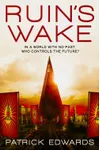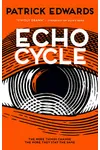Picture a Chicago-born storyteller who weaves science fiction with historical intrigue—meet Patrick Edwards! With a knack for crafting worlds that challenge perceptions, Edwards has carved a unique niche in speculative fiction. His debut novel, Ruin's Wake, and its follow-up, Echo Cycle, have captivated readers with their vivid narratives and thought-provoking themes, marking him as a rising star in the genre.
Born in 1982, Edwards’s journey from a sci-fi enthusiast to a celebrated author is as compelling as his stories. His unconventional writing process and diverse influences create tales that transport readers to dystopian futures and ancient pasts, all while exploring the human condition.
The Making of Patrick Edwards
Raised in Chicago, Patrick Edwards spent his childhood immersed in science fiction, inspired by visionaries like Iain M. Banks. His global upbringing in France, India, and Indonesia broadened his perspective, infusing his work with rich cultural textures. After studying French at Bristol University, including a year in Paris writing moody stories, Edwards honed his craft at Bath Spa University’s Creative Writing MA, graduating in 2015. This academic foundation, paired with his lifelong passion for speculative fiction, set the stage for his literary career.
Edwards’s decision to take writing seriously in 2014 was a turning point. Inspired by dystopian regimes like North Korea and the political thrust of Banks’s works, he began crafting narratives that blend personal struggles with societal critiques, launching his debut novel to critical acclaim.
Patrick Edwards’s Unforgettable Stories
Edwards’s debut, Ruin's Wake (2019), is a powerful dystopian tale set 500 years after a cataclysmic event. It follows three characters—an exiled soldier, a woman in an abusive marriage, and a scientist uncovering forbidden technology—whose fates intertwine in a totalitarian world. Praised for its vivid imagery and relatable characters, the novel earned a spot as a finalist in the Prometheus Awards. Reviewers lauded its emotional depth, with one noting, “Edwards’s female characters are exceptionally well-realised.”
His follow-up, Echo Cycle (2020), is a thrilling blend of sci-fi and historical fiction. Set in 2070, it explores a post-Brexit Britain and ancient Rome, connected through time-slips. Protagonist Winston Monk navigates Nero’s brutal court, while diplomat Lindon Banks uncovers sinister ties in a futuristic Europe. Critics hailed its adrenaline-fueled pacing and topical themes, with The Times calling it “a thrilling read, evoking harrowing feelings.”
Edwards’s style is marked by immersive world-building and emotional resonance. His narratives weave speculative elements with historical parallels, challenging readers to reflect on identity, power, and resilience. By drawing on real-world issues like surveillance and isolationism, he crafts stories that feel both fantastical and eerily plausible.
Why Patrick Edwards Matters
Patrick Edwards’s impact lies in his ability to merge speculative fiction with pressing societal questions. His works resonate with readers who crave stories that entertain while prompting introspection. By tackling themes like authoritarianism and personal freedom, Edwards invites us to examine our world through a futuristic lens. His growing fanbase and critical acclaim signal a promising future, with reviewers comparing his political insight to Iain M. Banks and his character depth to Adrian Tchaikovsky.
As a relatively new voice, Edwards’s influence is still unfolding, but his knack for crafting human stories in extraordinary settings has already left a mark. His exploration of marginalized voices and complex moral dilemmas ensures his work speaks to diverse audiences, making him a writer to watch in the sci-fi landscape.
- Born: 1982, Chicago, USA
- Key Works: Ruin's Wake (2019), Echo Cycle (2020)
- Awards: Finalist, Prometheus Awards (Ruin's Wake)
Snag Ruin's Wake or Echo Cycle and dive into Patrick Edwards’s thrilling blend of sci-fi and history! His stories will pull you in and leave you pondering long after the final page.

